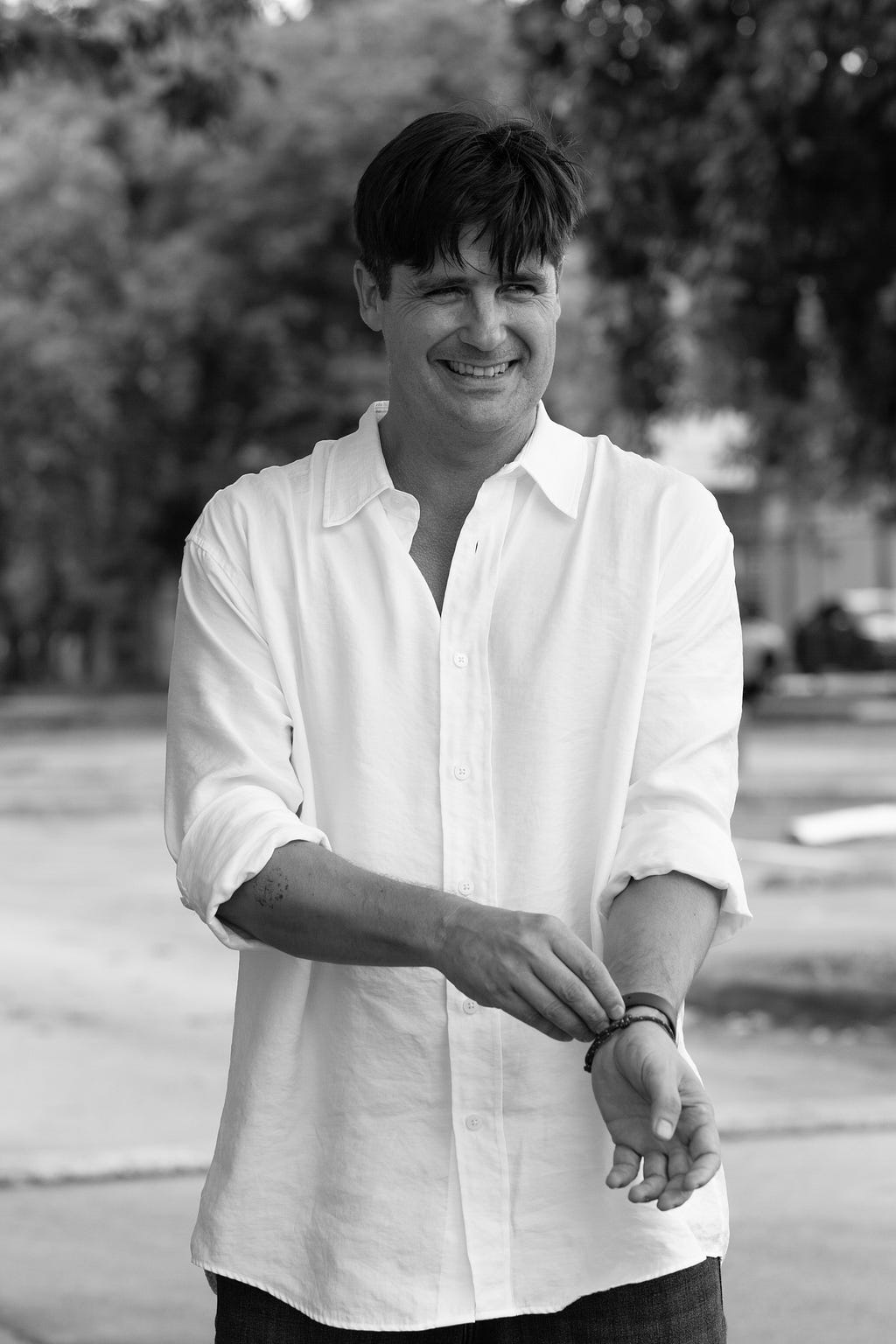Filmmakers Making A Social Impact: Why & How Filmmaker Sergio Vizuete Is Helping To Change Our World

Embrace failure: Making mistakes is a natural part of the process; you can learn from them. As a film director, embracing failure is crucial to both personal growth and the creative process. Mistakes and setbacks are inevitable in filmmaking, whether during pre-production, on-set, or post-production. Viewing these failures as opportunities rather than obstacles is critical to effectively navigating the industry’s complexities.
As a part of our series about “Filmmakers Making A Social Impact” I had the pleasure of interviewing Sergio Vizuete.
Spain-raised and Miami/LA-based filmmaker Sergio Vizuete has rapidly made his mark in the US, directing commercials for high-profile clients like the Los Angeles Lakers, T-Mobile, Ducati, Lexus, Real Madrid, and Walmart. He’s also worked with world-renowned talents including Kobe Bryant, Clayton Kershaw, Oscar de la Hoya, Becky G, and Camilo. Sergio’s work, known for its natural yet cinematic style, uses evocative visuals and atmospheres to convey deep emotions beyond dialogue. His films have participated in global festivals like the Emmy Awards, Cannes Film Festival, Clio Awards, and Tribeca Film Festival. Now, after directing several shorts, he’s moved into feature filmmaking with “BECOMING VERA,” a coming-of-age drama set for release in 2025.
Thank you so much for doing this interview with us! Before we dive in, our readers would love to get to know you a bit. Can you share your “backstory” that brought you to this career?
As a kid, I always enjoyed movies and storytelling but never saw film as a possible career. Only at age 15, when I helped friends with a student film, did I discover how much I enjoyed the dynamic atmosphere of a set. It still took a few years before I decided to pursue a career in film. Before making the switch, I studied Sociology for a while, but those experiences helped clarify my passion for storytelling and led me to take the plunge.
It has been said that our mistakes can be our greatest teachers. Can you share a story about the funniest mistake you made when you were first starting? Can you tell us what lesson you learned from that?
A friend of mine let me use his place to shoot a scene about a drug addict. The place was quite nice and tidy, which was not what we needed. I told the Production Designer we needed it to look more run-down. The next morning, I found she had spent the entire night making holes in walls and busting kitchen cabinets. We fixed the house, but you can imagine my friend’s reaction when he saw his apartment. Lesson learned: always keep clear communication with your team.
Who are some of the most interesting people you have interacted with? What was that like? Do you have any stories?
I have met some pretty fascinating people, but Kobe Bryant really stands out. We were shooting a campaign for the Los Angeles Lakers, and he turned out to be incredibly professional and super fun. While I was asking the players to shoot at an imaginary basket, Kobe caught my Spanish accent and could not resist teasing me. He joked that is why it is so hard to beat Spain — they must have some bizarre training methods! It was hilarious and just showed how down-to-earth he was.
Which people in history inspire you the most? Why?
Thomas Edison has always inspired me because of his relentless curiosity and work ethic. His famous quote — “Genius is 1% inspiration and 99% perspiration” — embodies his spirit and dedication to his craft. To me, Edison exemplifies how persistence can lead to success and shows that true joy comes from exploring and pursuing something you are passionate about. Stay calm; there is always a way to succeed.
Let’s now shift to the main focus of our interview, how are you using your success to bring goodness to the world? Can you share with us the meaningful or exciting social impact causes you are working on right now?
I have had the privilege of collaborating with organizations such as Voices For Children, Citrus, Miami-Dade County, and Animal Equality on various campaigns. Currently, I am in the final stages of post-production on a feature film, Becoming Vera, which explores the challenges faced by those aging out of the foster system. Additionally, I have worked with writer and producer Alberto Jaen on another upcoming film, Lights Up, which addresses the issue of homelessness. Both films are set for release next year.
Many of us have ideas, dreams, and passions that never manifest. But you did. Was there an “Aha Moment” that made you decide that you were actually going to step up and take action for this cause? What was that final trigger?
Shooting my first campaign for Voices For Children was a transformative experience. Working with the incredible foster children cast for our commercial, I witnessed their faces light up with the spotlight and attention we showered upon them. In those moments, they were not just stars for a day — they were a powerful reminder of the impact we can have. Their joy and resilience ignited a deep desire within me to make a difference, inspiring me to take meaningful action and embrace the role of a foster parent myself. Additionally, I began actively hiring individuals with a history in foster care for my productions. It is crucial to provide them with meaningful opportunities and support, helping them to thrive and succeed.
Can you tell us a story about a particular individual who was impacted or helped by your cause?
One of the former foster youths I hired for a production we shot in California has pursued a career in film with remarkable success. Today, he is an accomplished filmmaker who has earned a place at the prestigious Sundance Film Festival.
Are there three things that individuals, society or the government can do to support you in this effort?
We need more foster parents. By increasing the number of foster parents, we can improve the quality of care for children in the system and help ensure every child can thrive in a supportive and loving environment. We need to help them break the cycle so we can build a stronger and more resilient society.

What are your “5 things I wish someone told me when I first started” and why? Please share a story or example for each.
Collaborate: Find collaborators with skills you do not have and who challenge you. Seek collaborators who possess expertise in areas where you might lack proficiency — whether it is a technical skill like cinematography, a creative talent like scriptwriting, or an organizational strength like project management. This diversity not only complements your abilities but also enhances the overall quality of the project. Moreover, collaborating with people who challenge you intellectually and creatively can push you beyond your comfort zone and stimulate personal and professional growth.
Enjoy the process: The process encourages team creativity, collaboration, and enthusiasm. A positive atmosphere can lead to more spontaneous and genuine performances, as actors feel more comfortable experimenting with their roles and expressing their creativity. Fostering a culture of enjoyment and camaraderie can boost morale and keep the team motivated, even during long and challenging shooting days. This positive energy can also enhance problem-solving and adaptability, as team members are more likely to approach challenges with a constructive and resilient mindset.
Embrace failure: Making mistakes is a natural part of the process; you can learn from them. As a film director, embracing failure is crucial to both personal growth and the creative process. Mistakes and setbacks are inevitable in filmmaking, whether during pre-production, on-set, or post-production. Viewing these failures as opportunities rather than obstacles is critical to effectively navigating the industry’s complexities.
Learn how to give and RECEIVE feedback: Effective feedback should be specific, actionable, and delivered to encourage growth. For example, instead of saying, “That performance wasn’t good,” try, “I think you can bring more emotional depth to this scene by focusing on [specific aspect].” Receiving feedback is just as crucial. Be open to hearing and considering input from others, including your cast, crew, and even viewers. This openness demonstrates humility and can lead to valuable insights and improvements.
Develop your own voice: Do not accept everything as “this is just how it’s done.” It is important to start with a foundational understanding of traditional techniques and industry standards but do not let them constrain your creativity. Challenge conventional methods and ask yourself how you can innovate or reinterpret them to reflect your vision. Experiment with different styles, narratives, and techniques that resonate with your personal artistic sensibilities. This willingness to deviate from the norm can lead to groundbreaking and original content that stands out.
If you could tell other young people one thing about why they should consider making a positive impact on our environment or society, like you, what would you tell them?
I would tell them that their actions, no matter how small, can create a ripple effect that leads to significant change. Making a difference does not always require grand gestures; it starts with simple acts of kindness, awareness, and responsibility. When you contribute to a cause, you are helping others or the planet and shaping a better future for yourself and those around you.
We are very blessed that many other Social Impact Heroes read this column. Is there a person in the world, or in the US, whom you would like to collaborate with, and why? He or she might see this. 🙂
I would like to collaborate with Ken Loach. His films have always been an inspiration for me. He is a British filmmaker renowned for his socially conscious approach, often tackling subjects such as poverty, homelessness, and workers’ rights in his films. His films have served as a catalyst for reflection and reform, demonstrating art and media’s profound impact on shaping a more just and equitable society.
Can you please give us your favorite “Life Lesson Quote”?
There are three keys to open every door: please, thank you, and a smile.
How can our readers follow you online?
https://www.instagram.com/sergiovizuete/
https://www.linkedin.com/in/sergio-vizuete-343840/
This was great, thank you so much for sharing your story and doing this with us. We wish you continued success!
Filmmakers Making A Social Impact: Why & How Filmmaker Sergio Vizuete Is Helping To Change Our… was originally published in Authority Magazine on Medium, where people are continuing the conversation by highlighting and responding to this story.
